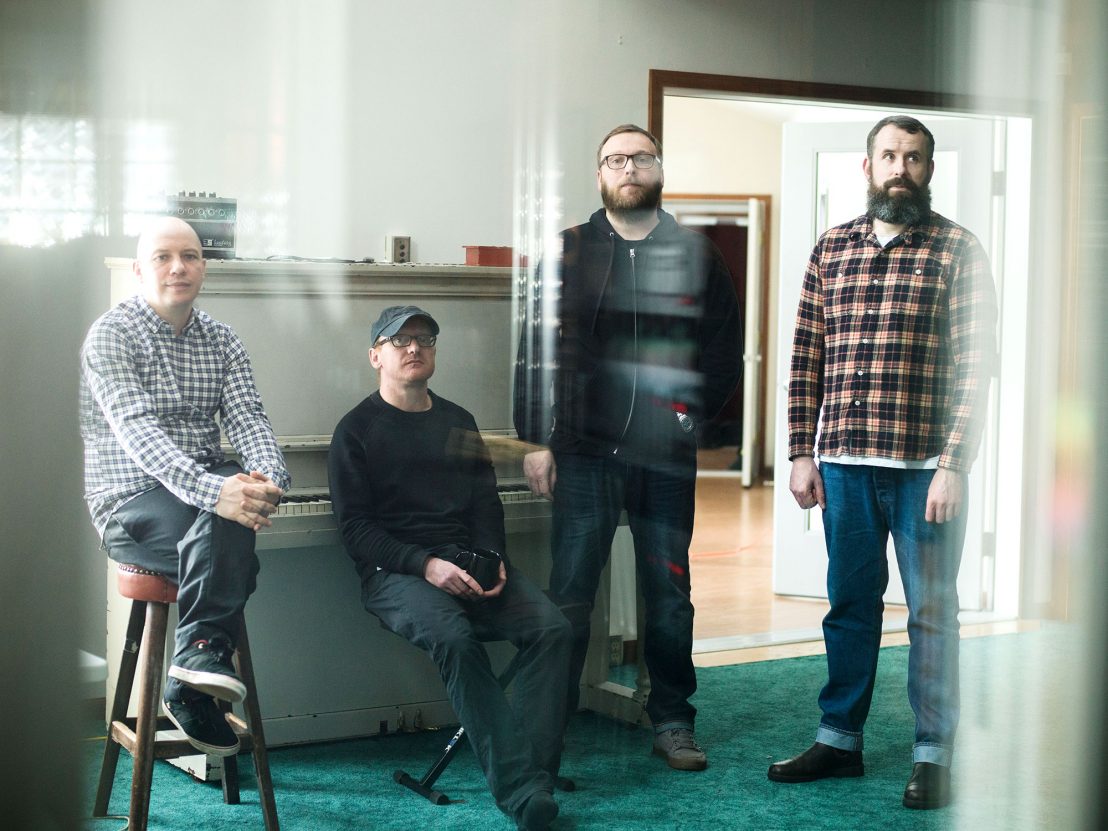
Mogwai are nothing if not prolific. Having spent nearly two-and-a-half decades carving a reputation as one of the most dependable purveyors of sprawling, cinematic post rock, the Scottish four piece are renowned for their epic soundscapes and seemingly tireless work ethic.
With nine studio albums under their belts, as well as scores for numerous projects, including documentaries Zidane and Before the Flood, as well French television series The Returned, they’re certainly not a band to rest on their laurels. It’s something of a surprise, then, that it’s taken Mogwai this long to venture into narrative feature films.
Their latest project is the action sci-fi Kin from directors Jonathan and Josh Baker. The band’s work on the film has also provided the basis for a standalone album – arguably their best in years. Guitarist Stuart Braithwaite sat down with LWLies recently to reflect on the challenges and process of creating the band’s latest original soundtrack.
“Directors Jonathan Baker and Josh Baker came to us. I think we liked what they had to say. They were interested in our music, rather than us sounding like someone else, which is what happens quite often. People tell you they want a film score like someone else and you think, ‘Well, you should have saved up and got them.’ They liked the music – the film sounded interesting – a bit different, but mainly they were good guys and pretty relaxed about what they wanted.”
“There was a script and they were about to start filming, so we knew who the characters would be played by, we saw some concept art and it was quite soon before they started filming. They started sending us rushes… They showed us concept art and a lot of references. The film’s got a lot of kind of nods to a lot of ’80s sci-fi stuff, which is what we grew up with as well. That was another thing that drew us to it.”
“It’s liberating at points and then suddenly you get someone telling you that those five minutes have got to be 40 seconds long and, ‘Can you make it more exciting?’, and all that stuff, so there’s a lot of hurdles that you’re not used to. I think we’re getting a bit more used to that with doing more scores, but you definitely have to leave your ego at the door in a lot of ways. But that’s alright. That’s fine.”
“I remember at the very start they said they were really in to the Zidane score that we did, which to be honest, apart from the one theme, none of us really liked. That was the thing that they had cut to a lot, or were writing to, but it changed a lot as the project went on. I think they liked The Returned too, which is a story, but I think that our music worked in that setting. But it was their first movie, so it was kind of cool because it was a first for them, but it was a first for us as well and I think that that kind of kept us all on our toes.”
“The vocals aren’t actually in the movie. We actually just put the vocals on for the record [on album closer ‘We’re Not Done’]. In the movie, the drums play for a minute and then the titles come up, but I guess we just thought it sounded so much like a song that we kind of finished it. That was just the process. We actually re-recorded most of the music for the record because that was the thing, like I said, with the length. Also, there were hardly any drums in the film, which was probably pretty handy since Mark the drummer was really ill while we were doing it, so we had to put drums on it separately. But yeah, the record’s a pretty different project to the actual score of the movie.
“We did it with The Returned and we did it with Atomic and I think it’s quite a nice thing to have this thing that’s not quite a studio album, but also isn’t quite a traditional soundtrack where you have the pieces that are the length of the cues in the movie. So yeah, we’ve done that with everything we’ve done so far. I don’t know if we’re going to keep doing it with everything. If we keep doing soundtracks, we don’t want to put a record out every six months, but yeah, I think people are quite fond of those records and it’s definitely something I’m glad we’ve done.”
“I mean, me personally, I think it’s to do with the personalities of the people making it. Obviously, there are subjects of documentaries that we wouldn’t touch with a bargepole, but I think it’s as much to do with the directors and how we get on with them that makes us want to do things, but I mean we’ve been lucky. Fabrice [Gobert], who did The Returned, and Mark Cousins, who did Atomic, were really good to work. We’ve been lucky to work with really good people.”
Kin: Original Motion Picture Soundtrack Album by Mogwai is available to stream and download now.
Published 29 Sep 2018

By Paul Weedon
Ursine Vulpine, whose work has appeared in teasers for Alien: Covenant and The Last Jedi, discusses his creative process.

By Paul Weedon
The Devo frontman discusses the pair’s collaborations and plans for a Wes Anderson theme park.

By Paul Weedon
The experimental German composer discusses his favourite OST.